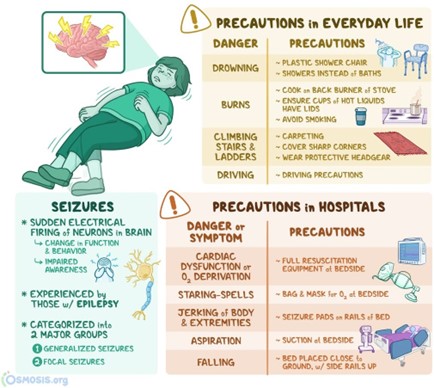The nurse asks a client who is about to have a cardiac catheterization about any allergies. The client states, "I always get a rash when I eat shellfish." Which of the following is the priority nursing action?
Ask the client if any other foods cause such a reaction.
Notify the provider of the client's allergy.
Notify the dietary department of the client's allergy.
Atach a wrist band indicating the client's allergy.
The Correct Answer is B
The priority nursing action is to notify the provider of the client's allergy because shellfish allergy may indicate an allergy to iodine, which is commonly used as a contrast dye in cardiac catheterization. This could cause a severe allergic reaction or anaphylaxis during the procedure, which could be life-threatening. The provider may need to order a different type of contrast dye or premedicate the client with antihistamines or steroids to prevent an allergic reaction.
a. Ask the client if any other foods cause such a reaction is wrong because it is not the priority action and it does not address the potential risk of iodine allergy.
c. Notify the dietary department of the client's allergy is wrong because it is not relevant to the cardiac catheterization and it does not prevent an allergic reaction during the procedure.
d. Atach a wrist band indicating the client's allergy is wrong because it is not sufficient to alert the provider or the catheterization team of the client's allergy and it does not prevent an allergic reaction during the procedure.
Nursing Test Bank
Naxlex Comprehensive Predictor Exams
Related Questions
Correct Answer is D
Explanation
Moving objects away from the client is an important action to take during a seizure, as it can prevent injury and protect the client from harm.
"Place the client on his back." is not correct, as it can cause airway obstruction and aspiration. The client should be placed on his side, preferably in a lateral recumbent position, to allow saliva and secretions to drain from the mouth.
"Restrain the client." is not appropriate, as it can cause injury, increase agitation, or prolong the seizure. The client should be allowed to move freely during a seizure, but supported and guided away from hazards.
"Insert a padded tongue blade into the client's mouth." is not advisable, as it can cause oral trauma, choking, or damage to the teeth. The client should not have anything inserted into his mouth during a seizure, as he cannot swallow or bite his tongue. The nurse should ensure that the client's airway is clear and patent.
Correct Answer is D
Explanation
The nurse should place a towel under the client's head to protect it from injury during the seizure. The nurse should also loosen any tight clothing, remove any objects that could harm the client, and maintain a patent airway.
Place the client in a prone position is wrong because it can compromise the client's breathing and increase the risk of aspiration. The nurse should place the client in a side-lying position after the seizure to facilitate drainage of oral secretions and prevent aspiration.
Holding the client's arms and legs still is wrong because it can cause injury to the client or the nurse. The nurse should not restrain or interfere with the client's movements during the seizure but rather ensure a safe environment and observe the seizure activity.
Leaving the client to get help is wrong because it can endanger the client's safety and well-being. The nurse should stay with the client during the seizure and call for assistance if needed, but not leave the client alone or unattended.

Whether you are a student looking to ace your exams or a practicing nurse seeking to enhance your expertise , our nursing education contents will empower you with the confidence and competence to make a difference in the lives of patients and become a respected leader in the healthcare field.
Visit Naxlex, invest in your future and unlock endless possibilities with our unparalleled nursing education contents today
Report Wrong Answer on the Current Question
Do you disagree with the answer? If yes, what is your expected answer? Explain.
Kindly be descriptive with the issue you are facing.
